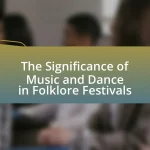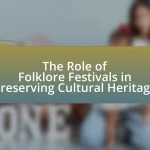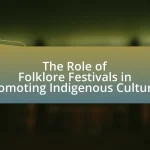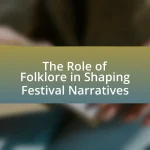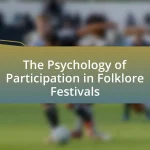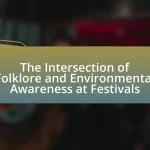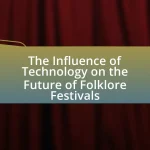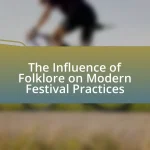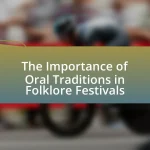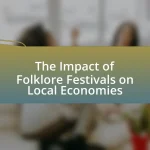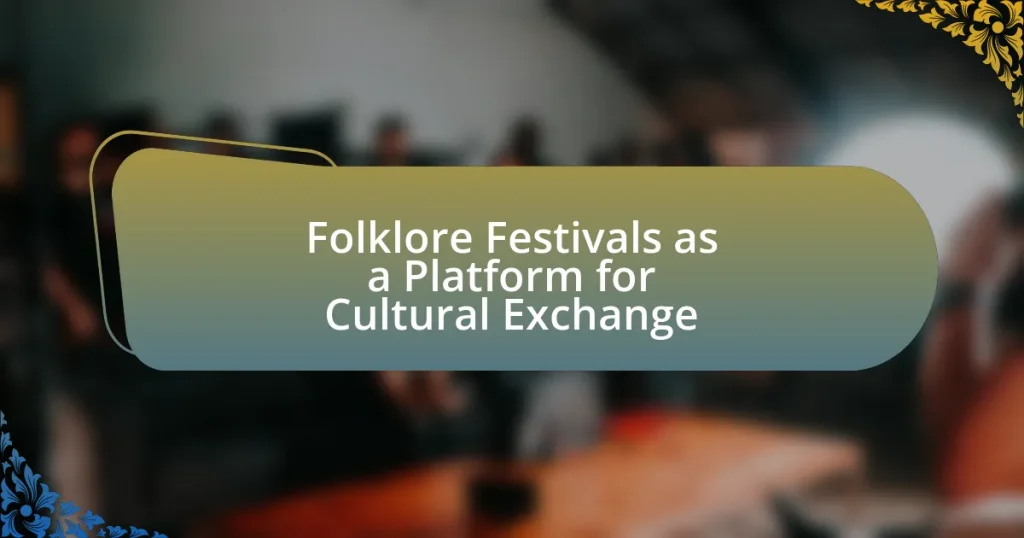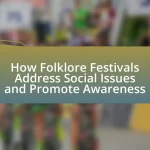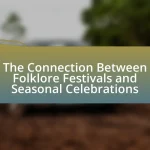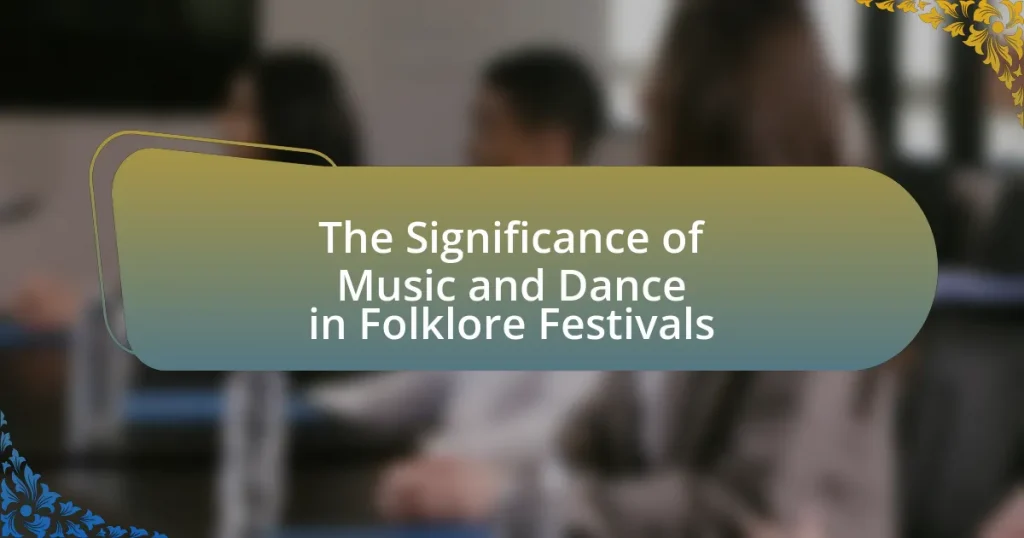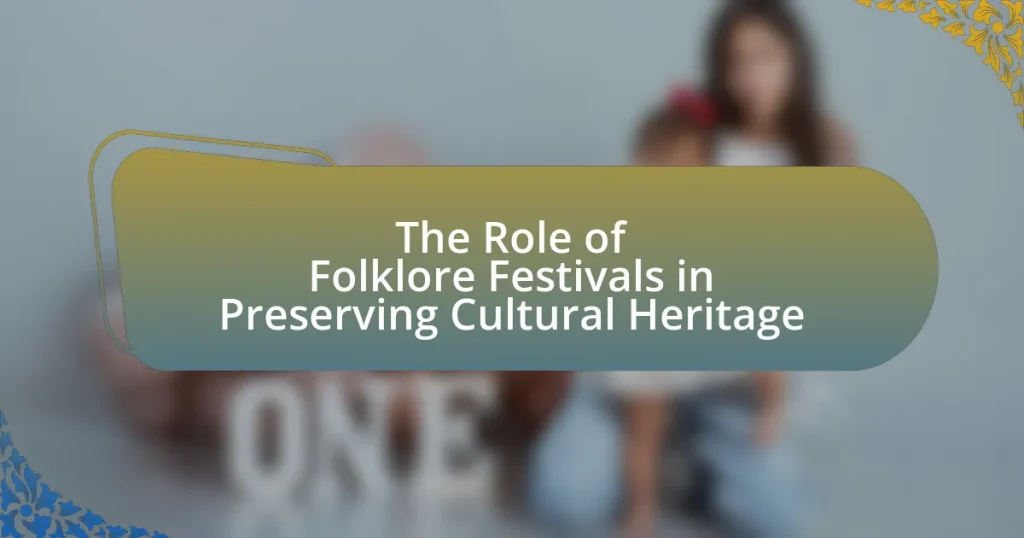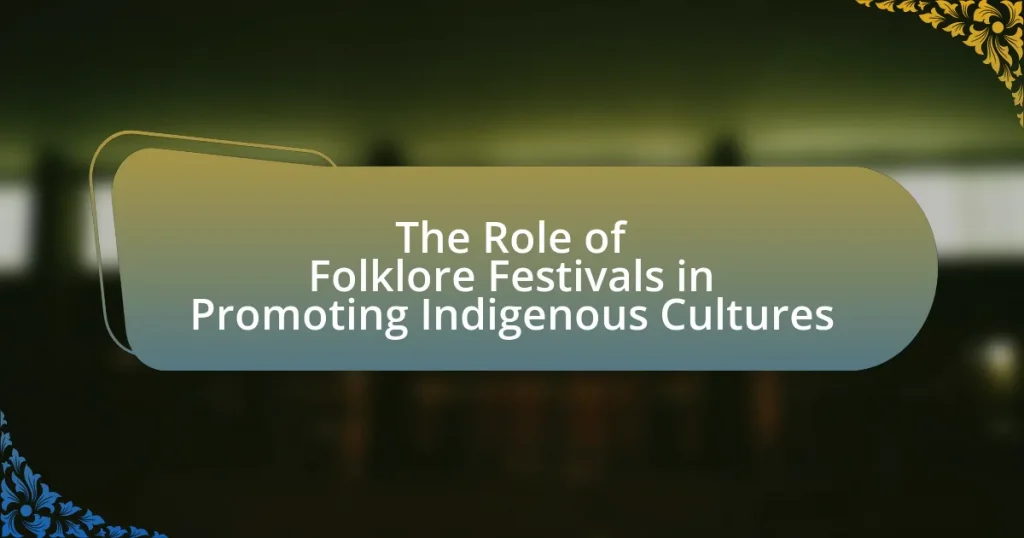Folklore festivals are events that celebrate traditional cultural practices, arts, and crafts, serving as vital platforms for cultural exchange. These festivals promote understanding by showcasing diverse traditions through music, dance, storytelling, and culinary arts, allowing participants to engage directly with different cultures. They play a crucial role in preserving cultural heritage, facilitating intergenerational knowledge transfer, and fostering community engagement. However, folklore festivals also face challenges such as cultural appropriation and commercialization, which can impact their authenticity. Notable examples worldwide highlight the significance of these festivals in enhancing cultural diversity and economic benefits for local communities.
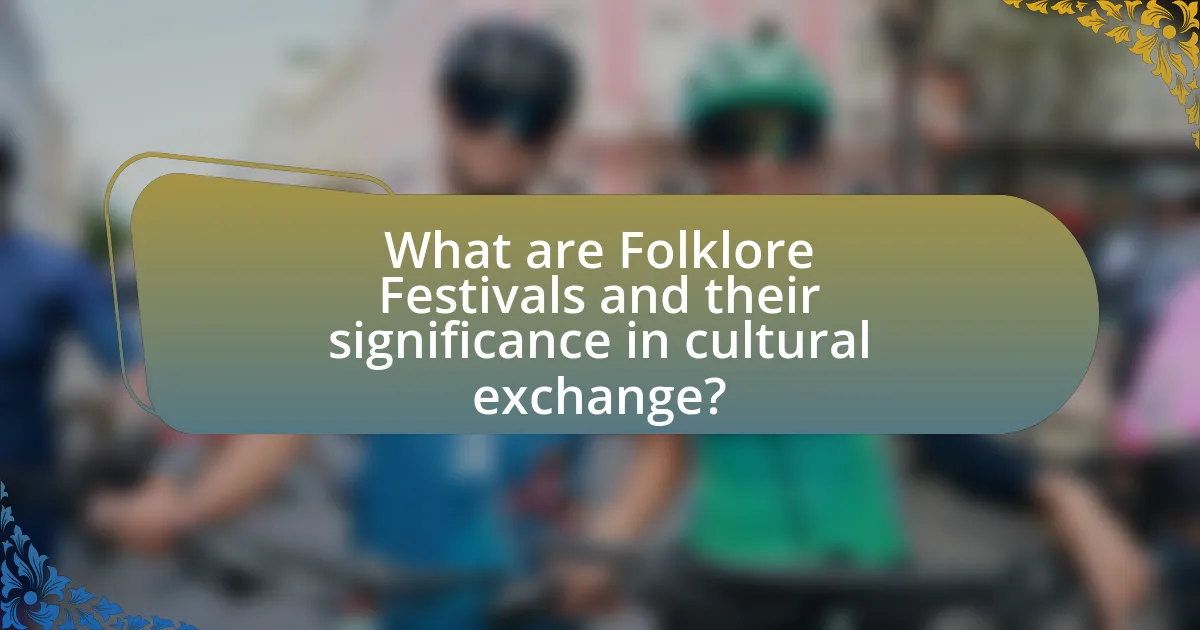
What are Folklore Festivals and their significance in cultural exchange?
Folklore festivals are events that celebrate and showcase traditional cultural practices, arts, and crafts, often featuring music, dance, storytelling, and food unique to specific communities. These festivals serve as significant platforms for cultural exchange by bringing together diverse groups, allowing for the sharing of traditions and fostering mutual understanding. For instance, the International Folklore Festival in Neuchâtel, Switzerland, attracts performers from over 30 countries, promoting cross-cultural dialogue and appreciation. Such interactions not only preserve cultural heritage but also encourage collaboration and innovation among different cultural groups, enhancing global cultural diversity.
How do Folklore Festivals promote cultural understanding?
Folklore festivals promote cultural understanding by showcasing diverse traditions, arts, and practices from various communities. These events facilitate direct interaction among participants and audiences, allowing individuals to experience and appreciate different cultural expressions firsthand. For instance, festivals often feature traditional music, dance, crafts, and culinary arts, which serve as tangible representations of cultural heritage. Research indicates that such immersive experiences can enhance empathy and reduce cultural biases, as attendees gain insights into the values and histories of other cultures. By fostering dialogue and collaboration, folklore festivals create a shared space for learning and respect, ultimately contributing to a more inclusive society.
What types of cultural expressions are showcased at Folklore Festivals?
Folklore festivals showcase a variety of cultural expressions, including traditional music, dance, crafts, storytelling, and culinary arts. These festivals serve as platforms for communities to present their unique heritage, often featuring performances of folk songs and dances that reflect local history and customs. For instance, traditional crafts such as weaving, pottery, and woodwork are commonly displayed, allowing artisans to demonstrate their skills and share cultural significance. Additionally, storytelling sessions often highlight local legends and folklore, enriching the audience’s understanding of cultural narratives. Culinary arts are also prominent, with local dishes being prepared and shared, emphasizing the region’s gastronomic traditions.
How do participants engage with different cultures during these festivals?
Participants engage with different cultures during folklore festivals through immersive experiences that include traditional performances, culinary exchanges, and interactive workshops. These activities allow attendees to experience diverse cultural expressions firsthand, fostering understanding and appreciation. For instance, traditional dance performances showcase unique cultural narratives, while food stalls offer authentic dishes that reflect the culinary heritage of various communities. Additionally, workshops on crafts or music provide hands-on opportunities for participants to learn and engage directly with cultural practices, enhancing their connection to the cultures represented.
Why are Folklore Festivals important for preserving traditions?
Folklore festivals are important for preserving traditions because they serve as vibrant platforms for showcasing and transmitting cultural heritage. These festivals facilitate the intergenerational exchange of knowledge, allowing older generations to pass down customs, stories, and practices to younger audiences. For instance, UNESCO recognizes the role of such festivals in safeguarding intangible cultural heritage, highlighting that they help maintain community identity and continuity. By bringing together diverse groups, folklore festivals also promote cultural understanding and appreciation, ensuring that traditional practices remain relevant in contemporary society.
What role do Folklore Festivals play in maintaining cultural heritage?
Folklore festivals play a crucial role in maintaining cultural heritage by serving as vibrant platforms for the preservation and celebration of traditional customs, arts, and practices. These festivals facilitate intergenerational transmission of cultural knowledge, allowing communities to showcase their unique identities through music, dance, crafts, and storytelling. For instance, the Smithsonian Folklife Festival in the United States highlights diverse cultural expressions, fostering appreciation and understanding among different ethnic groups. Additionally, UNESCO recognizes the importance of such festivals in safeguarding intangible cultural heritage, emphasizing their role in promoting cultural diversity and social cohesion.
How do these festivals adapt traditional practices for modern audiences?
Festivals adapt traditional practices for modern audiences by incorporating contemporary themes, technology, and interactive experiences. For instance, many folklore festivals now feature digital storytelling and social media engagement to attract younger participants, enhancing accessibility and participation. Additionally, these festivals often blend traditional performances with modern music genres, making the cultural expressions more relatable. Research indicates that such adaptations can increase attendance by up to 30%, demonstrating their effectiveness in appealing to diverse demographics while preserving cultural heritage.
What challenges do Folklore Festivals face in cultural exchange?
Folklore festivals face several challenges in cultural exchange, primarily including cultural appropriation, misrepresentation, and logistical barriers. Cultural appropriation occurs when elements of one culture are adopted by another, often without understanding or respect, leading to tensions between communities. Misrepresentation can arise when performances or displays do not accurately reflect the traditions or values of the culture being showcased, potentially perpetuating stereotypes. Logistical barriers, such as funding, accessibility, and language differences, can hinder effective communication and participation among diverse cultural groups, limiting the potential for genuine exchange. These challenges can undermine the intended purpose of folklore festivals as platforms for authentic cultural interaction and understanding.
How do commercialization and globalization impact Folklore Festivals?
Commercialization and globalization significantly transform folklore festivals by altering their traditional practices and audience engagement. Commercialization often leads to the prioritization of profit over cultural authenticity, resulting in the commodification of cultural expressions, where traditional performances are tailored to attract larger audiences and sponsors. For instance, festivals may feature more mainstream entertainment to increase ticket sales, which can dilute the original cultural significance of the events. Globalization facilitates the exchange of cultural elements across borders, allowing folklore festivals to incorporate diverse influences, but it can also lead to cultural homogenization, where unique local traditions are overshadowed by global trends. This dual impact can enhance visibility and appreciation of folklore but risks undermining the distinctiveness of local cultures.
What measures can be taken to ensure authentic cultural representation?
To ensure authentic cultural representation, it is essential to involve community members in the planning and execution of cultural events. Engaging local artists, storytellers, and cultural leaders allows for genuine expressions of their traditions and practices. Research indicates that festivals that prioritize local participation, such as the Smithsonian Folklife Festival, successfully showcase authentic cultural narratives and practices, fostering a deeper understanding among attendees. Additionally, implementing educational programs that highlight the history and significance of the represented cultures can enhance appreciation and respect, further ensuring authenticity in representation.
How do Folklore Festivals facilitate community engagement?
Folklore festivals facilitate community engagement by providing a platform for local residents to participate in cultural activities, share traditions, and foster social connections. These festivals often include performances, workshops, and food stalls that encourage interaction among attendees, thereby strengthening community bonds. For instance, a study by the National Endowment for the Arts found that participation in cultural events, such as folklore festivals, significantly enhances social cohesion and community pride. This engagement not only promotes cultural heritage but also encourages collaboration among diverse groups, leading to a more inclusive community environment.
What are the economic benefits of hosting Folklore Festivals?
Hosting folklore festivals generates significant economic benefits, including increased tourism, local business revenue, and job creation. These festivals attract visitors who spend money on accommodations, food, and entertainment, thereby boosting the local economy. For example, a study by the National Endowment for the Arts found that cultural events can generate up to $4 in economic activity for every $1 spent on the event itself. Additionally, local artisans and vendors benefit from increased sales opportunities, while temporary jobs are created in event management, hospitality, and security. Overall, folklore festivals serve as a catalyst for economic growth in the communities that host them.
How do Folklore Festivals contribute to local economies?
Folklore festivals contribute to local economies by attracting tourists, which increases spending in various sectors such as hospitality, retail, and food services. For instance, a study by the National Endowment for the Arts found that cultural events can generate significant economic impact; festivals often lead to increased hotel bookings, restaurant patronage, and sales for local artisans. Additionally, these festivals create job opportunities, both temporary and permanent, in event management, security, and vendor services, further bolstering the local economy.
What opportunities do they create for local artisans and performers?
Folklore festivals create significant opportunities for local artisans and performers by providing a platform to showcase their crafts and talents to a broader audience. These events often feature artisan markets where local craftspeople can sell handmade goods, thus generating income and promoting their cultural heritage. Additionally, performers gain exposure through scheduled performances, allowing them to reach new audiences and potentially secure future engagements. For instance, a study by the National Endowment for the Arts highlights that festivals can increase local economic activity by up to 20%, directly benefiting artisans and performers involved.
What are some notable examples of Folklore Festivals worldwide?
Notable examples of folklore festivals worldwide include the National Folk Festival in the United States, the Festival of American Folklife, and the International Folklore Festival in Romania. The National Folk Festival, held annually in various locations since 1934, showcases diverse cultural traditions through music, dance, and crafts, attracting thousands of visitors. The Festival of American Folklife, organized by the Smithsonian Institution, celebrates the cultural heritage of various communities across the U.S. with performances and workshops. The International Folklore Festival in Romania, established in 1966, features traditional music and dance from various countries, promoting cultural exchange and understanding among participants and audiences. These festivals serve as vital platforms for preserving and sharing cultural traditions globally.
How do different regions celebrate their unique folklore through festivals?
Different regions celebrate their unique folklore through festivals by showcasing traditional music, dance, crafts, and storytelling that reflect their cultural heritage. For instance, the Day of the Dead in Mexico honors deceased loved ones with vibrant altars, parades, and traditional foods, emphasizing the importance of family and remembrance in Mexican culture. Similarly, the Edinburgh Festival Fringe in Scotland features performances that highlight Scottish folklore, including tales of mythical creatures and historical events, attracting artists and audiences from around the world. These festivals serve as platforms for cultural exchange, allowing communities to share their stories and traditions, thereby fostering understanding and appreciation among diverse populations.
What lessons can be learned from successful Folklore Festivals?
Successful Folklore Festivals demonstrate the importance of cultural preservation and community engagement. These festivals often highlight traditional arts, music, and crafts, fostering a sense of identity and continuity within communities. For instance, the Smithsonian Folklife Festival showcases diverse cultural expressions, attracting over a million visitors and emphasizing the value of cultural exchange. Additionally, successful festivals often incorporate educational programs, which enhance understanding and appreciation of different cultures, as seen in the National Folk Festival’s workshops that engage attendees in hands-on learning experiences. These elements illustrate that effective folklore festivals can serve as vital platforms for cultural dialogue and mutual respect among diverse populations.
What best practices can enhance the impact of Folklore Festivals on cultural exchange?
Best practices that can enhance the impact of Folklore Festivals on cultural exchange include fostering collaboration between local and international artists, promoting interactive workshops, and utilizing digital platforms for broader outreach. Collaboration between artists from diverse backgrounds encourages the sharing of unique cultural narratives, as evidenced by the success of the Smithsonian Folklife Festival, which showcases cultural traditions from around the world. Interactive workshops allow festival attendees to engage directly with cultural practices, enhancing understanding and appreciation, similar to the approach taken by the Festival Internacional de Folklore in Spain, where hands-on experiences are integral. Additionally, leveraging digital platforms, such as social media and live streaming, can expand the festival’s reach, as demonstrated by the virtual adaptations of many festivals during the COVID-19 pandemic, which allowed for global participation and cultural exchange despite physical limitations.
